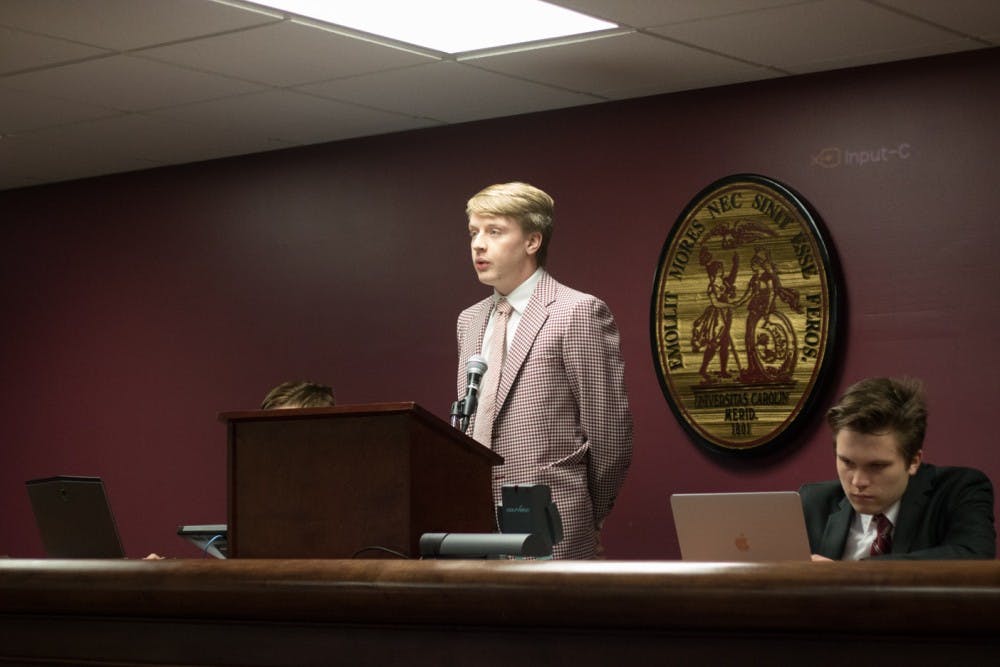This year’s student senate finished out the year Wednesday night with a discussion about USC's mandatory healthcare requirements for students.
During the second half of the session, Sen. Jamison McClintock introduced SBL 110 89, entitled “A recommendation to remove the mandatory health insurance policy placed on University of South Carolina undergraduate and graduate students.”
Since last fall, USC has required undergraduate and graduate students taking at least six credit hours to have health insurance, either through their own providers or a university healthcare plan, which costs approximately $2,047 a year. The proposed bill sought to remove this requirement and to allow students to have health insurance only if they chose to do so.
Following Sen. McClintock’s proposal, Sen. Ward Jolles took to the podium to express his belief that repealing the requirement would lead to students who otherwise could and would be insured opting out of getting insurance.
“This bill is voting to remove a requirement that everybody's insured,” Jolles said. “And I think that doing that in itself is retrograde in nature, as opposed to being progressive.”
The conversation turned into a discussion about how being required to pay for health insurance could potentially negatively impact lower and middle class students.
Sen. Patrick Greene, who is against the university's policy, explained his position after the Senate ended, saying that the lower and middle classes sometimes struggle to get enough aid for school and healthcare. He believes the university's healthcare policy hurts those students.
The lengthy debate, which led to the session’s 8 p.m. deadline being extended until 8:45 p.m., also included a personal account from Sen. Zane Oakes about why he believes the proposed bill does not address all the problems involving students and healthcare.
Oakes described medical problems he has encountered throughout the semester which have made him unable to pay for both the university and his medical bills. Oakes said that he is withdrawing from the university next semester due to his financial difficulties, but that health insurance has been important to him throughout this process.
“If I did not have insurance, I would not have been able to make it this far into college,” Oakes said. “I think this is a very good issue to talk about, but I don’t think this is the bill that does it.”
Oakes later elaborated on what he would like to see if another bill were created by the next student senate to address the problems students face with paying for health care.
“What I would like to see are some exemptions that are similar to the exemptions that are in the Affordable Care Act,” Oakes said. “Exemptions such as demonstrating a financial need that would not allow you to continue in the university as a student.”
After continued debate on the bill, the final vote found there was not a sufficient majority from the senators to pass. This means the healthcare policy will remain as is unless brought up again during the 111th Senate session, which begins Wednesday.
After the session concluded with final addresses, Speaker of the Senate Patrick Ellis discussed the importance of this continued debate.
“I think it’s a debate that’s long overdue,” Ellis said. “I think one way or another, the student senate needs to weigh in on whether we think it’s good to compel students to have that health insurance policy or where we stand on the policy.”
Reflecting on the work of the 110th student senate, Ellis also expressed his pride for the work he believes the group has done throughout the past year.
“I’ve been involved in Student Government since my freshman year, and I’ve been blown away consistently by how seriously these senators have taken their jobs,” Ellis said. “They’ve really etched out a new role for the student senate as a co-equal branch within Student Government, and one that considers legislation that is relevant to students here at Carolina.”

